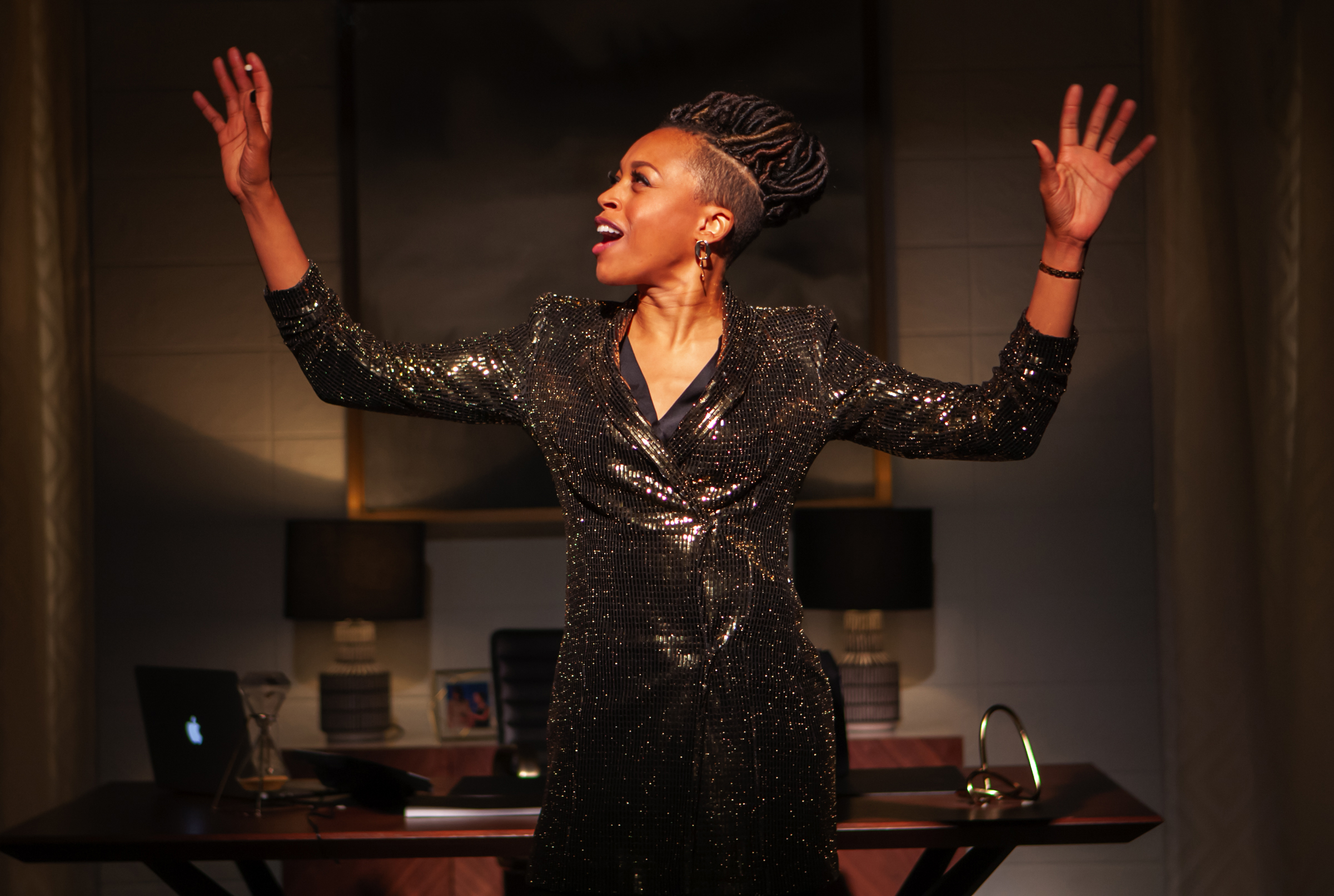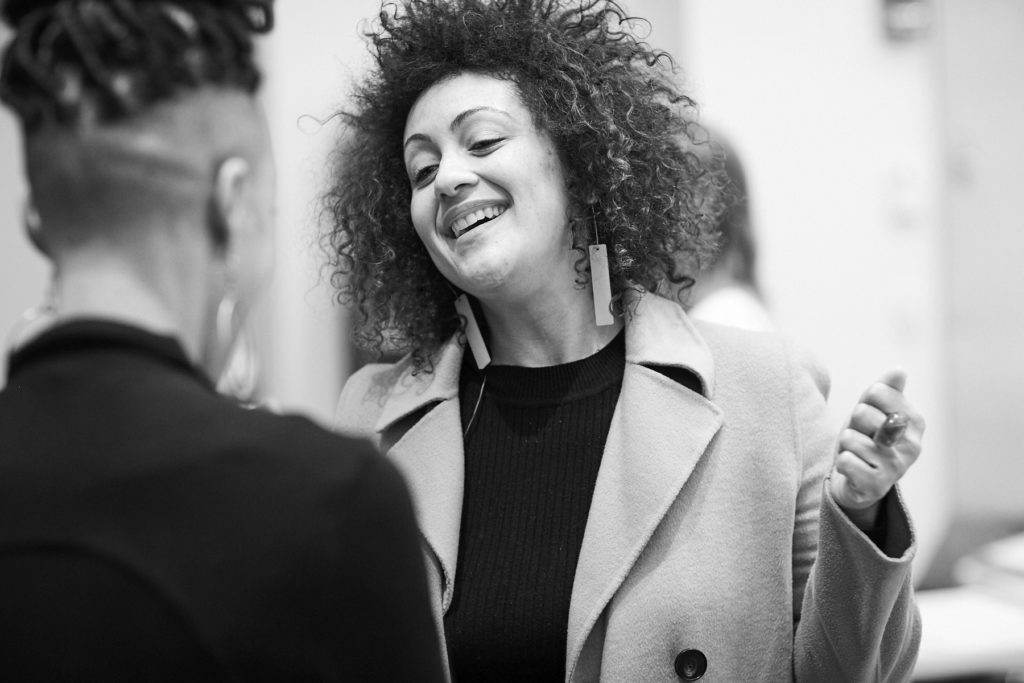Director Lileana Blain-Cruz’s latest play, “Fabulation, or The Re-Education of Undine,” sees her telling the story of Undine, a powerful and wealthy publicist who falls down the ladder of success after her husband loses all her money and is sent to prison. She’s then brought face to face with the very real prejudice and discrimination that exists in America today.
The play was written by Pulitzer Prize-winning playwright Lynn Nottage (“Sweat”) nearly 15 years ago. Blain-Cruz first read “Fabulation,” which won an Obie Award, as a college student. Now she’s working alongside Nottage on its New York City revival.
Blain-Cruz has directed plays in NYC and at theaters across the United States. She recently directed “The House That Will Not Stand” at the New York Theatre Workshop and won an Obie Award in 2017 for directing Suzan-Lori Parks’ “The Death of the Last Black Man in the Whole Entire World” at the Signature Theatre Company. Her other theater credits include “Pipeline,” “Red Speedo,” and “War.”
We spoke to Blain-Cruz about “Fabulation, or The Re-Education of Undine,” collaborating with Nottage, and the kinds of projects she most enjoys working on.
“Fabulation, or the Re-Education of Undine” is playing at the Signature Theatre until Sunday, January 13. Ticket information can be found on the theater’s website.
W&H: What is it like being a theater director in 2019?
LBC: It’s exciting. I think there has been a lot of turmoil in recent years, as well as a lot of questioning — questions about the status quo, questions about how things have been going, questions about how our society functions and works. I think that it is an important time to make art and create dialogue. As a director, I get excited with wrestling these questions in the pieces I work with — whether it’s a period piece like “The House That Will Not Stand” or a contemporary, comedic reflection on society’s imperfections with a play like “Fabulation.”
I think that being a director is challenging. I work with assistant directors, who are all wonderful and are faced with the same catch-22: how do you make work that gets seen when you are starting out? Either more people are aware of that or more people are advocating for that so young people can have more opportunities earlier in their careers. I’ve been grateful to places like New York Theatre Workshop, Soho Repertory Theatre, and LCT3 [Lincoln Center Theater]. They are all taking more chances on younger artists and are giving them platforms. I feel bolstered by the fact that people are willing to take more risks on younger artists.
W&H: Do you find yourself gravitating towards particular types of work? “Fabulation” is a very important piece of theater with a lot of social relevance.
LBC: It is. To what I was saying before about making work for the moment you’re in, I think I gravitate toward pieces that feel urgent or necessary for the moment. That’s why I think Lynn Nottage is so amazing. She’s so politically in tune with problems that are happening in our society. Comedy has been a lesser-known part of her strategy; people are more familiar with her tragedy.
For me, it was exciting to work with these themes in a very different medium. “Fabulation” is probably the most straightforward comedy I’ve ever worked on. It’s also really refreshing because people need a moment to laugh. Because of the stress and tension that we’re living in, we need an opportunity to commune with love. That has been such a powerful part of this experience.
W&H: What was your own response when you first read the play?
LBC: I first read the play in college, so it feels like a full circle moment of first being introduced to theater and now coming 15 years after the play was originally written and getting to re-envision it for this particular moment.
It’s also exciting because in some ways the play is quite subtly an anti-capitalist narrative. We place so much value on success, productivity, money, and individuality. Lynn, in the most buoyant and light-hearted way, says, “There are other things like caring for others beyond yourself or recognizing the ways of which the system that helped you survive kept others back.”
It’s a re-education — a re-learning of ways to be a human being.
W&H: So it’s not just Undine’s education, it’s the audience’s education, too. In that vein, what response do you hope theatergoers will have to the play?
LBC: Especially being in a place like NYC, just walking around in this city, you experience a sense of go, go, go. Everyone’s working, everyone’s moving, everyone’s excited and tense. Over the course of the play, or I hope over the course of the play, Undine’s heart begins to open after being in a closed-off place. Watching her transformation, you begin to feel an opening. It’s really fascinating. Even between the first and second act, people are breathing differently and seem much more open to laughter.
The play is called “Fabulation” and you think of that title in relation to a fable or moral, or an opening of the heart. I hope that people’s hearts will open watching this play. That’s my goal, my hope, and I feel like I’ve been watching that happen. People seem to be leaving the theater elated.

Cherise Boothe in “Fabulation, or The Re-Education of Undine”: Monique Carboni
W&H: I read that you do a lot of research before each production. That must have been an intense process for this play as it takes place in so many different settings.
LBC: We looked into different PR agencies and what life would have been like for Undine with her parties and lifestyle. We looked into the Walt Whitman Project [New York City Housing Authority’s Walt Whitman]. City planning is really sad, especially when you think of what becomes of black communities. Interestingly, Lynn wrote the play “Intimate Apparel” around the same time that she wrote this play. [That play is set in New York City in 1905 and concerns a young African-American woman who travels to New York to pursue her dreams.] There was a revisiting of that play and we were thinking about what that character would have been like 100 years later in the universe.
Montana Levi Blanco is the costume designer for “Fabulation” and we did a lot of visual research around NYC. It feels like this show is an ode to NYC. You have this ensemble of characters who are playing multiple parts. Look at the way NYC is built as well as the creativity around the black body and how the black body is a canvas for that creativity. Montana did a beautiful job bringing out that love song to NYC. A lot of the delving into the play was with this company of actors and doing communal research around addict circles, social services, and people’s personal experiences.
W&H: What was your process like with the actors — particularly with each actor playing so many roles at once?
LBC: I have a real love for the character actor, the folks who love to transform. There’s a tricky line because when an actor does that kind of transformation, there can be a temptation to create caricature as opposed to the character. I think they all really held that line of maintaining the reality of the people they were playing, even if it lived in a heightened environment.
The actors did a lot of work to add truth to the play. There are the addict circle scenes where eight of the 10 people don’t say anything. But each character has a backstory. The actors developed their names, histories, what addictions they have, where they come from. So that work is really joyous because Lynn threw out a scenario and everyone colored it in with depth and humanity.
W&H: What was your collaboration like with Artistic Director Paige Evans and the play’s lead actress, Cherise Boothe?
LBC: Paige and I had originally worked at LCT3 together with Branden Jacobs-Jenkins, [an American playwright and MacArthur Fellow for 2016]. I’ve always appreciated her trust and openness with me as a director. She’s always asking really practical questions and ultimately trusts the vision I have for a piece.
With this play, she described the process like revisiting an old friend and said we should welcome the joy inside that. She made some adjustments with some of the play’s language because 14 years have passed and things have changed. Fifteen years ago, the play mentioned newspaper media and now it’s about social media and Instagram. Paige made those micro-adjustments and came in with so much positivity for the process.
Cherise is amazing. Undine never leaves the stage. She basically goes through 20-something scenes. She needs to both convey time and not be caught in the whirlwind of her life that is currently falling apart — or as she describes it, she’s “falling into grace.” She really tackled the role with such specificity. She really bolstered the ensemble around her.
I guess I’m on a kick of noting when people do good, kind things. It is possible to make, create, and be generous, even while presenting a character who starts off really ungenerous and then learns how to grow.
W&H: What is next for you?
LBC: I’m currently working on a play at LCT3 called “Mary’s Seacole” by Jackie Sibblies Drury, [which debuts February 9th].
I’m also directing an opera in Omaha, Nebraska. It’s a new production of “Faust” and is my first opera as a director. It’s an exciting opportunity because it’s a form of authorship. The opportunity to work on classics, revivals, or operas is a chance to change the shape of the story. I’m thrilled to get to take a provocative look at Faust. You watch the character Faust, who makes this deal with the devil over the course of the play, learn how everything he assumed to be great is actually false and that love is actually key.
W&H: That sounds strangely similar to the theme of “Fabulation.”
LBC: Yes, it does. It’s funny because you gravitate towards these same themes in different iterations and explorations.







